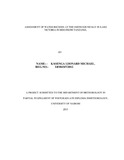| dc.description.abstract | An environmental degradation in the form of wetland destruction has been evident at the
tip tail of the Smith Sound bay of Lake Victoria. Therefore the main objective of this
study is to assess the changes that are occurring at the smith Bay by determining their
causes and possible impacts, and the specific objectives of this study include the
following: -To determine the trend in water level, determination the trend of rainfall at
the area and to ascertain the possible causes to the trends in the variation of the water
levels.
Data was collected between June and July 2013 using various participatory
techniques, including in-depth household interviews of direct wetland resource users
(e.g. farmers, fishers, traders, hunters, herdsmen, craft makers etc), Key Informants
(local administrators, CBO and local NGO leaders) and direct observations, Group
discussions were held with community members of Ilalambogo and Lubili who reside in
the affected area. The study was able to elicit historical perspective of the area, their
views on the causes and effects of the drying up wetland.
Transect walk with the local members was done to observe, ask, listen, discuss and
identify different zones, soils, land use, vegetation and discuss problems.
The sampled population consisted of 150 randomly selected household respondents
living within the bay.
Discussion of the findings done by peoples accounts of the past major events, ecological
histories and changes in water use and analysis of data by SPSS and Exel.
Result shows that water recedes was contributed by, Pumping of water from the bay to
the gold mines near by i.e. Kakola mines. Overgrazing by hundreds of cattle from
Shinyanga, Geita, kwimba and the local ones near the bay and Current agricultural
activities such as chickpea growing, sweet potatoes etc have accelerated the decline of
water.
Lastly, the study gives conclusions reached, that it was true that Smith Sound bay has
dried up in parts and its water were recedes in other parts of the bay. hence Lake
recession increased availability of land for agriculture and crop yields, fishery to
food security and household income showed a marked declined.
I suggests some recommendations mainly to do an analytical research on a much larger
catchment area to include surrounding districts of Geita, Shinyanga and Missungwi and
to conduct an outreach programme in the area with an aim of creating public awareness
on environmental issues also National policies on wetland conservation management
which can conform with agricultural development policies are | en_US |

